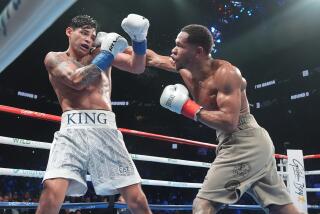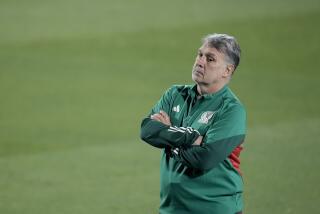Maradona’s Ban Will Probably End His Career : Soccer: FIFA’s 15-month suspension for failed World Cup drug test makes comeback slim for Argentine star.
- Share via
The sometimes glittering and always controversial soccer career of Argentina’s Diego Maradona appears finished.
In Zurich, Switzerland, on Wednesday, FIFA, soccer’s international governing body, banished Maradona from the sport for 15 months for failing a drug test during this summer’s World Cup in the United States.
The ban is the second in three years for the Argentine midfielder, who also received a 15-month worldwide suspension in 1991 after testing positive for cocaine use in Italy.
The latest ban, retroactive to June 30, means that Maradona will be one month shy of his 35th birthday when it expires on Sept. 29, 1995. By then, it will be too late for him to revive his international career and it is unlikely that any club team would want to risk signing him.
Reactions to FIFA’s announcement were immediate. In Buenos Aires, Argentine President Carlos Menem called it “a kind of persecution” and said he felt FIFA had been overly punitive.
“We expected something lighter,” Menem said. “We thought expelling him from the World Cup had been enough. This looks like too much, a very harsh punishment.”
Maradona, meanwhile, was trying to deflect the blame.
“You can tell these guys at FIFA have no families,” he said. “They really didn’t take anything into consideration.”
FIFA’s World Cup Organizing Committee, chaired by Mexico’s Guillermo Canedo and including members of each of FIFA’s six continental confederations, said it did its utmost to be fair.
The vote to suspend Maradona for taking a so-called “cocktail” of five banned substances, including the stimulant ephedrine, was unanimous. The player had tested positive after Argentina’s first-round World Cup victory over Nigeria on June 25.
“We do not want to destroy him for his actions,” FIFA spokesman Guido Tognoni said, “but it was always said we should deal with this case without keeping in mind he was Maradona.
“This case shows FIFA is a credible organization with credible doping tests.”
Joseph (Sepp) Blatter, FIFA’s general secretary, said the decision is final and no appeal can be made.
In addition to the ban, FIFA also fined the player $15,000--a token amount considering, for example, that Maradona was paid more than $1.3 million by an Argentine television network for five minutes of exclusive commentary each day during the World Cup.
Financially, neither the fine nor the ban will affect Maradona, who not long ago claimed that his personal finances were such that “my daughters can eat caviar for the rest of their lives.”
His pride, however, will have been deeply wounded and it is quite likely that he yet again will renounce the sport and retire as he had done four or five times in the past when confronted by setbacks.
He almost certainly no longer will be a member of the Argentine national team, especially with former coach Alfio Basile having stepped down and with Daniel Passarella, a defender on Argentina’s 1978 World Cup-winning team, about to become coach.
Passarella’s instructions will be to rebuild the Argentine team, with the first goal being to defend Argentina’s Copa America title next June in Uruguay and then, more importantly, to put together a team capable of not only qualifying for but actually winning the 1998 World Cup in France.
Maradona’s ban still will be in effect during the Copa America, or South American Championship, and he will be well over the hill by 1998.
Similarly, on the club level, he is unlikely to find himself a particularly marketable commodity at 35, especially given his tendency to gain weight and lose fitness when he is not playing regularly.
It might well be his battle to get back in shape in time for World Cup ’94 that prompted him to experiment with the performance-enhancing drugs that caused his latest downfall.
“It is absolutely scientifically proved that these products have a positive action on the central nervous system, increasing a player’s ability and physical action,” said Michel d’Hooghe, the Belgian who heads FIFA’s Medical Committee.
Maradona was not in Zurich to hear FIFA’s decision. He was represented by Julio Grondona, president of the Argentine soccer federation, and by his attorney, Daniel Balotnicoff, who argued that the positive drug test resulted from a mix-up in using two similarly named medications.
FIFA did not buy that excuse and decided after a three-hour, closed-door meeting to ban the player who captained Argentina to its World Cup triumph in 1986 and to second place in 1990.






